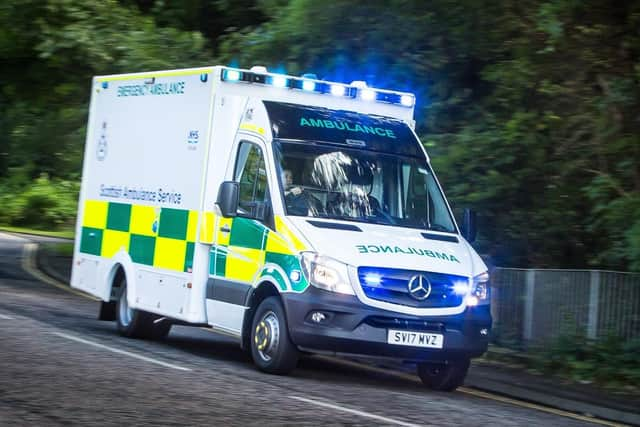Ambulance crews call for 'urgent meeting' with Police Scotland over mental health call outs
An ambulance workers’ union has called for an urgent meeting between Scotland’s emergency services regarding mental health call outs, following comments made by Police Scotland’s Chief Constable Jo Farrell.
At a meeting of the Scottish Police Authority last month, Ms Farrell said her force “must reset the parameters of our role in responding to people living with poor mental health”.
Advertisement
Hide AdAdvertisement
Hide Ad“Each year, officers deploy to well over 100,000 mental health related incidents - the equivalent work of between 500 and 600 full time officers,” Ms Farrell said.


“In over 87 per cent of these incidents, no crime has taken place.
“Resetting those parameters will help ensure the most appropriate help is provided and allow officers to return to preventing crime and responding to threat, harm and risk as soon as possible after the moment of crisis has passed and public safety is assured.”
GMB Scotland, the biggest union in the Scottish Ambulance Service (SAS), said crews were alarmed by the comments.
Karen Leonard, GMB Scotland organiser in the ambulance service, said any decision by the national force to unilaterally change officers’ responsibilities will impact on other emergency workers.
“We can understand the frustration of officers being asked to wait with mentally ill patients who are a risk to themselves or others but that does not justify simply walking away,” said Ms Leonard.
“These patients and those near them in the emergency ward need to be protected and if not by the police then by who?
“Ambulance crews are already spending more time with patients inside A&E and that should not be their job either.
Advertisement
Hide AdAdvertisement
Hide Ad“The role of Police Scotland is to protect the public and to simply announce it is no longer willing to do so in certain situations is unacceptable.”
Leonard, who has written to health secretary Neil Gray asking him to call a meeting of all 999 services, added: “We need serious engagement with all the emergency service to establish a way forward that protects patients and staff.”
Robert Pollock, GMB Scotland convenor in the ambulance service, said police support is hugely appreciated by crews on calls but investment is needed to provide necessary support for patients suffering mental health issues.
“Police can often be stood down after patients are assessed in the emergency department but this might be hours after arrival and 999 crews or hospital staff cannot be the fallback position,” Mr Pollock said.
“The irrational behaviour associated with mental health crises can be triggered without warning and emergency departments are not the ideal place for those experiencing such crises.
“The problem is that mental health specialist facilities are full and overflowing. Investment is needed.”
The union last year raised concern that police were no longer routinely joining crews at 999 callouts to 4500 properties red-flagged by SAS as potential dangerous when 160 ambulance workers were assaulted last year.
Ms Leonard said: “If our members do not have a choice about going to potentially dangerous properties neither should the police.
Advertisement
Hide AdAdvertisement
Hide Ad“Any decision not to escort ambulance crews to red-flagged properties must be based on guidelines agreed across the emergency services.
“Our members in the ambulance service report for work with no idea where they will be sent and are often called to very fraught and potentially violent situations.
“They deserve every possible support from both managers at the Scottish Ambulance Service and other frontline emergency services.”
A Scottish Ambulance Service spokesperson said: “Along with other strategic partners, we work closely with Police Scotland and meet on a regular basis to discuss ongoing work and collaboration opportunities. Patient care and staff health and well-being are our top priorities.”
Health Secretary Neil Gray said: “I am grateful to police and ambulance staff for all they do to support those in distress or suffering from mental ill health. The Scottish Government is working with health and justice partners to ensure resources are deployed appropriately and to reduce unnecessary demand on officers.
“The Scottish Government and Scottish Police Authority established a multi-agency group to implement a comprehensive programme of work, to improve support for those in need to access the right service at the right time, and to reduce demand on officers.
“Resources are being targeted at specific programmes such as the Enhanced Mental Health Pathway for those in distress or in need of mental health support who come into contact with Police Scotland and the Scottish Ambulance Service.
“We are also increasing mental health workforce capacity in key settings, and spend by NHS Scotland on mental health has increased to over £1.3 billion in 2022/23.”
Comments
Want to join the conversation? Please or to comment on this article.